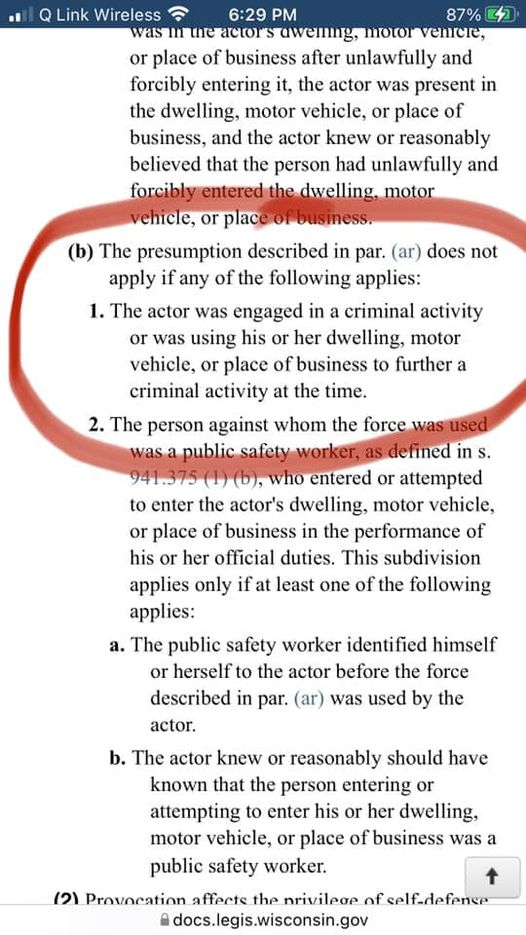This appears to apply to all criminal activity, BUT
It only applies when defending a dwelling or business
and only removes a presumption, not the full right to self defense
It has no effect on the Kyle Rittenhouse case.
When interpreting the law, you can't take one sentence out of context and try to apply it. You must read the entire law, and interpret each statement in context.
In Wisconsin statute 939.48 (Self-defense and defense of others), the section you are citing is (1m)(b)(1). It contributes to 939.48(1m)(b), which modifies 939.48(1m)(ar), which expounds on (1).
To paraphrase the law,
939.48 (self-defense)
1) A person may only use lethal force to defend themself or others from an immanent crime that would cause death or great bodily harm.
1ar) When defending your home or business, you may presume that someone breaking in poses the threat of death or great bodily harm.
1b) On second thought, you MAY NOT presume this under a couple of conditions:
1b1) You are actively engaged in criminal activity
1b2) You have reason to believe the person breaking in is a police officer, fire fighter, or paramedic engaged in their lawful duty.
In legal terms, a presumption is something you shall / may act on before you have firm evidence to the contrary.
If someone is breaking into your home, you do not have to identify them or see clear evidence of a threat (e.g., if it's too dark to see).
BUT if you can see someone clearly, and see a clear threat / clear lack of threat, you are no longer acting under presumption.
So,
If you are in bed, and someone breaks into your house, you may normally fire on them without clearly seeing a weapon.
But if your spouse flips on the light and the intruder sees your gun and surrenders, you may no longer fire. You have firm evidence the intruder is not a threat.
If you are hacking into the pentagon's computers late at night, and someone kicks in your door, you may not shoot at them, because you cannot presume threat. (It may be the FBI serving a no-knock warrant.)
But if you flip on the the light and see someone in a ski mask threatening you with a crow bar, you may shoot him. You now have firm evidence of a threat to your life.
None of this has any effect on the Kyle Rittenhouse case.
Kyle was not defending his dwelling or business.
Kyle's legal defense does not rest on a (claimed) presumption of threat, it rests on (claimed) evidence of threat.
Likewise, the accusations against Kyle don't claim that illegal possession of a firearm negates self-defense.
I don't know of any case law in Wisconsin involving self-defense while illegally carrying a gun, but there's nothing in the statute law that would bar self-defense in that situation.
